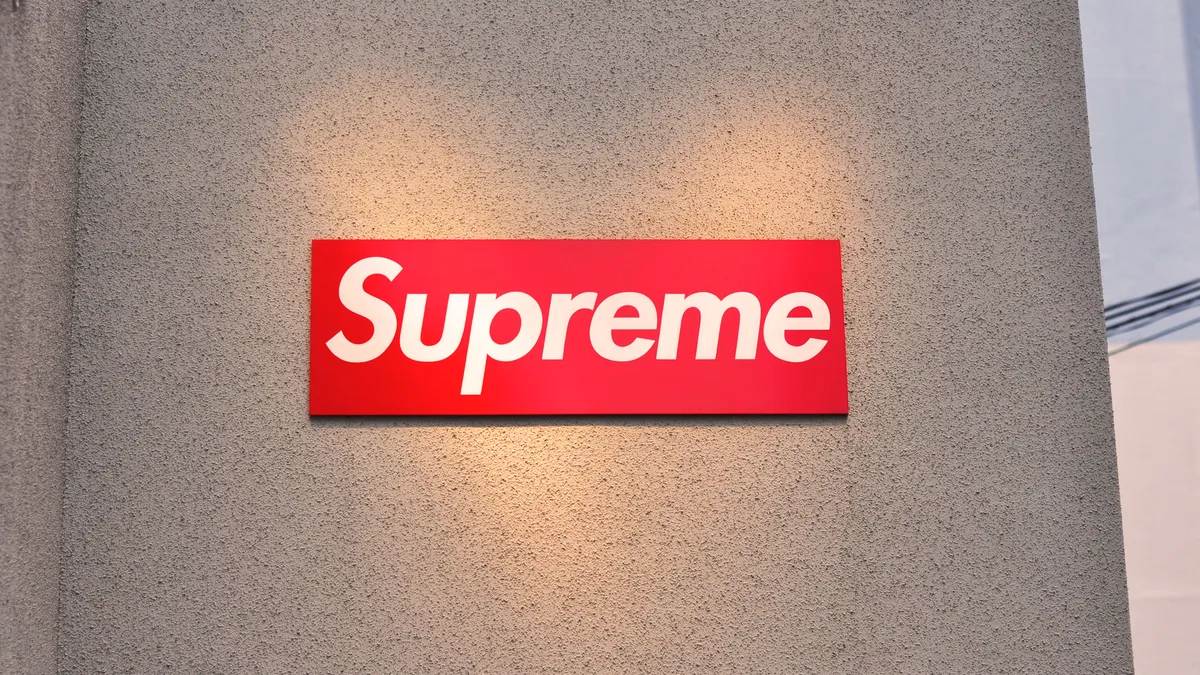Dive Brief:
-
VF Corp. on Monday said it has a deal to acquire streetwear brand Supreme for $2.1 billion, expected to close later this year, according to an investor presentation.
-
Supreme founder James Jebbia and the brand's senior leadership team will stay with the company, which will remain headquartered in New York City, according to a company press release.
-
VF expects Supreme to contribute at least $500 million in revenue in its next fiscal year and be "modestly accretive" this fiscal year.
Dive Insight:
Since it opened in the mid-'90s as a skateboarding shop in New York City, Supreme has vaulted into cult status among young consumers worldwide. The brand has carefully guarded its price points and desirability through small weekly drops and intense online engagement.
Soon it will join a conglomerate. VF executives Monday morning took pains to say that they're aware that Supreme's healthy popularity and margins depend on a scarcity model and that they wouldn't be meddling in the Supreme team's approach. But they also said that VF's scale could help drive a compound annual growth rate of between 8% and 10%, and that Supreme could eventually become a billion dollar brand, at least.
Stores are also scarce at Supreme, which only runs 12 globally. The brand has been especially a hit in the U.S. and Japan, and executives said they see potential in China and elsewhere in Asia more broadly. VF CEO Steve Rendle called the brick-and-mortar store "the ultimate expression of the brand" and said that that under VF, new Supreme locations will open "where the Supreme followers and lovers exist."
Indeed, despite the steep price VF stands to gain from Supreme's enduring appeal, according to Shawn Grain Carter, professor of fashion business management at the Fashion Institute of Technology. "Supreme has amazing consumer brand loyalty among Generation Z and Gen Y Millennials on a global scale," she said by email. "Over 60% of their revenue is generated online and that leaves plenty of opportunity to leverage this momentum and scale up through retail store expansion. With only 12 stores in Paris, Tokyo, NYC and others, this skateboard brand has plenty of upside potential for solid growth."
But bringing Supreme into VF's portfolio creates tension between strategic undersupply and expansion, according to some analysts. Credit Suisse analyst Michael Binetti called it a key question that may have to be mapped out. Wells Fargo Senior Analyst Ike Boruchow said, "The biggest question mark, in our view, stems from the ability to balance growth and brand perception."
"Supreme's business model has been predicated on scarcity (which has driven the extremely strong fullprice sell-throughs and high margins), so VFC needs to be careful about driving growth without losing the brand's 'secret sauce,'" Boruchow said in emailed comments.
Matt Powell, NPD Group's senior industry adviser for sports, said that while it's not an impossible achievement, it is a rare accomplishment.
"Scarcity and growth are oppositional," Powell said by email. "Jordan proves you can have both, but it is a really complicated science."
One area of expansion discussed by executives is getting into footwear, a move Powell called "a great idea."
"VF knows how to make shoes," he said, adding that the company should restrict any future collaborations to other VF brands, like Vans. "Many of the successful Supreme collabs have been footwear."
The Supreme acquisition is perhaps the most high profile move in VF's continual adjustment of its portfolio, and may not be its last, executives said Monday. Merger-and-acquisition and sell-offs have been key to its growth strategy, including the 2018 spinoff of its heritage Lee and Wrangler denim business and the pruning of several smaller underperforming brands earlier this year, as well as some acquisitions.
VF's portfolio now encompasses the active/outdoor, work and street categories. The latter includes, in addition to Vans and soon Supreme, The North Face, Timberland and Dickies, all of which VF considers "street inspired." Supreme has previously collaborated with Vans, Timberland and The North Face, with the first Vans-Supreme collab in 1996, Wells Fargo analysts noted.
















